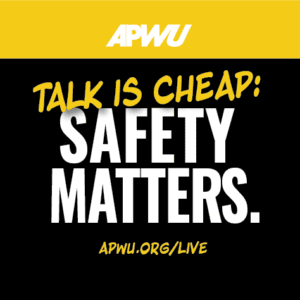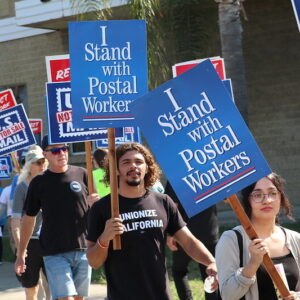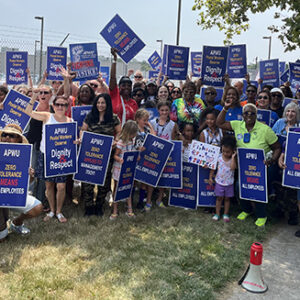March 1, 2016
Postal Lives at Risk
(This article first appeared in the March-April 2016 issue of The American Postal Worker magazine.)
A shocking lack of security at many of the nation’s 21 Network Distribution Centers (NDCs) is jeopardizing the lives of postal employees.
Unfortunately, postal management seems unresponsive.
During the All-Craft Conference in October 2015, I had the opportunity to attend the BMC Conference, where the lack of security and lack of control of vehicles entering and exiting BMC yards generated passionate debate. (BMCs are also known as Network Distribution Centers or NDCs).
Officers, stewards, and members from many of the NDCs gave examples of yard control problems that convinced MVS Craft officers that the concerns were legitimate and needed immediate attention.
The safety concerns raised were:
- There are no yard access control procedures at most NDCs.
- Non-postal personnel often drive into the yards with no entry-level security.
- Security personnel, when they are present, frequently just wave trucks in.
- At some locations, contractors enter the yard, pick up over-the-road containers (also called “BMC containers”) take them to a scrap yard, and sell them – for their own profit.
- There have been incidents of violence and security breaches at many NDCs.
- Language barriers often make communication difficult.
- Many types of vehicles enter the yards without authorization.
Totally Unacceptable
Realizing the urgency of this safety hazard, we wrote to the Postal Service upon our return from the All-Craft Conference to alert management to the multitude of serious NDC concerns.
“The process of allowing trucks and other vehicles access to USPS property and premises appear to have drastically changed and have gone in a direction that is totally unacceptable and violates Homeland Security protocols,” we wrote.
The union asked the Postal Service to provide us with the current protocols for vehicles entering NDCs. However, the reply from the USPS did not address the union’s safety concerns.
Due to the Postal Service’s lack of response, the APWU has initiated a Step 4 dispute protesting safety conditions at NDC truck entrances.
We also contacted the Office of the Inspector General (OIG), and are providing the OIG with information and statements in our attempt to abate this safety hazard.
HCR Renewals
The APWU has repeatedly challenged the Postal Service’s failure to give the union timely notice of HCR renewals and newly established routes. In some cases there was no notice at all – management simply renewed or established new contract without informing the union.
The arbitration of Case # Q06C-4Q-C11182451, which addressed the appropriate remedy for these violations, was heard Nov. 12 and 13, before Arbitrator Shyam Das. The case focused on what should happen when the Postal Service fails to comply with the time limits outlined in Article 32.2.B of the Collective Bargaining Agreement and fails to provide proper notification of HCR renewals.
Article 32.2.B says:
For highway contracts covered by Article 32, Section 2, the Union will be furnished the information enumerated in Paragraph C below. This information will be furnished at least sixty (60) days prior to the scheduled installation of the service. Within forty (40) days of being furnished such information, the Union may request a meeting to discuss a specific contract(s). Within forty-five (45) days of being furnished such information, the parties will exchange the basic cost analyses in order to facilitate discussions. The parties will meet on or before the sixtieth (60) day. At no time will the subject highway contract(s) for which a meeting has been requested be awarded prior to the actual meeting.
The union identified over 200 HCRs where management notified the union after the time limits identified in Article 32.3.B or failed to notify the union at all.
The union asserts that there must be a meaningful remedy when the USPS violates the time limits the parties have agreed to in the contract.
The case was originally scheduled for arbitration on Sept. 14, 2014, but the USPS challenged the APWU’s right to arbitrate the case, claiming the issue had been settled in a 2004 arbitration decision on Case # Q94V-4W-C98044752, also known as “the St. Petersburg Case.”
However, Arbitrator Das ruled in March 2015 that the case could be arbitrated. The second part of the hearing was Nov. 12-13, 2015. Post-hearing briefs were due in February.
The USPS has instructed management’s Labor Relations Specialists in the field to hold all HCR Non-Notification grievances filed at the local level in abeyance, pending the outcome of Arbitrator Das’ award.
Be keenly aware: The APWU did not – and does not – agree to hold cases filed in the field pending the outcome of this case. We believe the remedy must be based on the circumstances of each case. Therefore, it is improper to hold any HCR Non-Notification of HCR grievances in abeyance. Please continue to advocate for our work at all levels.
The Jobs Memo
We have initiated an additional dispute on the Postal Service’s failure to comply with Section 2 of the Motor Vehicle Craft Jobs Memorandum of Understanding (MOU), which requires management and the union to review of 8,000 HCR routes.
We have also initiated a dispute on all four components of the MVS Jobs MOU. This dispute articulates the Postal Service’s failure to live up to any of their agreements to the MVS craft in the 2010-2015 Collective Bargaining Agreement.
The MVS Craft must raise awareness and advocate for our cause. This is our fight, from the workroom floor to our office door. We must be proactive in saving our work. If we fail to advocate for ourselves, who will?




